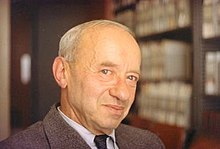Alfred Tarski
| Alfred Tarski | |
|---|---|
 |
|
| Born | Alfred Teitelbaum January 14, 1901 Warsaw, Congress Poland |
| Died | October 26, 1983 (aged 82) Berkeley, California, United States |
| Citizenship | Polish American |
| Nationality | Polish |
| Fields | Mathematics, logic, philosophy of language |
| Institutions |
|
| Alma mater | University of Warsaw |
| Doctoral advisor | Stanisław Leśniewski |
| Doctoral students | |
| Known for |
|
| Influences | Charles Sanders Peirce |
| Influenced | |
Alfred Tarski (/ˈtɑːrski/; January 14, 1901 – October 26, 1983) was a Polish logician, mathematician and philosopher. Educated at the University of Warsaw and a member of the Lwów–Warsaw school of logic and the Warsaw school of mathematics and philosophy, he immigrated to the USA in 1939 where he became a naturalized citizen in 1945, and taught and carried out research in mathematics at the University of California, Berkeley from 1942 until his death.
A prolific author best known for his work on model theory, metamathematics, and algebraic logic, he also contributed to abstract algebra, topology, geometry, measure theory, mathematical logic, set theory, and analytic philosophy.
His biographers Anita and Solomon Feferman state that, "Along with his contemporary, Kurt Gödel, he changed the face of logic in the twentieth century, especially through his work on the concept of truth and the theory of models."
Alfred Tarski was born Alfred Teitelbaum (Polish spelling: "Tajtelbaum"), to parents who were Polish Jews in comfortable circumstances. He first manifested his mathematical abilities while in secondary school, at Warsaw's Szkoła Mazowiecka. Nevertheless, he entered the University of Warsaw in 1918 intending to study biology.
...
Wikipedia
